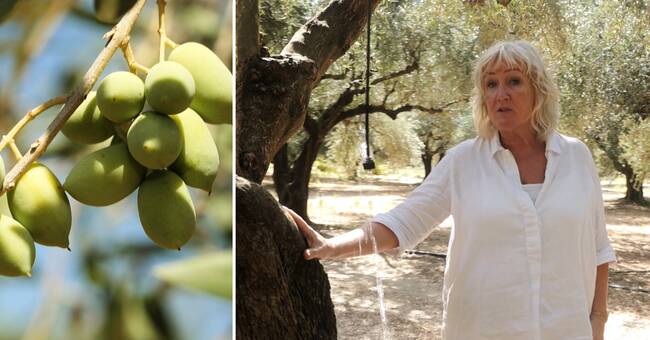- Look here, says olive farmer George Kokkinos.
He is holding a branch with some sparse olives.
The heat wave in May with temperatures of up to 41 degrees caused the olive trees to end up in a so-called thermal shock.
The nutrients were withdrawn from the flowers, which affected pollination.
Now the Kokkinos family in western Greece will get a lousy harvest of black olives.
For millennia, olive groves have been an obvious part of the civilizations around the Mediterranean.
In both the Qur'an and the Bible, the olive branch is a symbol of peace, love and celebration.
The trees are perfectly adapted to live in the dry and warm climate and have deep roots that can withstand periods without water.
"Climate change"
It is also a billion dollar industry and olive oil is exported all over the world.
But the climate is changing.
While the global average temperature has increased by just over one degree since pre-industrial times, the corresponding increase around the Mediterranean is 1.7 degrees.
It may sound a bit but as a comparison it can be mentioned that it is six degrees that separates us in Sweden from the ice age.
- It has become warmer and wetter, but we also get more and more events with extreme weather, says George Kokkinos.
In 2016-2017, almost half of the olive harvest in Italy and 30 percent of the harvest in Greece were wiped out due to the aggressive bacterium Xylella fastidiosa.
It is an example of pests that thrive better with the warmer winters and the wetter weather.
SVT gets to see how olive farmers get in their tractors in spacesuits and gas masks and spray the trees with herbicide.
- It does not feel good to do it but we have to because the harvest in 2018 was completely wiped out by pests, says Yannis Sourelis, olive farmer.
In the next olive grove, water is bubbling in 34-degree heat.
Long black plastic hoses run in the air between the trees and irrigate the olive trees.
When watering olive trees, it causes the roots of the trees to face upwards towards the ground and the easily accessible water.
This leads to olive trees being felled much more easily because they are not as stable with a shallower root system.
The stress of facing cold, heat and pests weakens olive trees.
Reduced harvests
Even though olive farmers are resorting to increasingly expensive and environmentally harmful methods, harvests around the Mediterranean in some places have decreased by up to 20 percent in the last decade, according to the International Olive Council.
The Kokkinos family has joined the EU project "OliveClima" to find new ways to save the olive harvest from climate change.
There they learn, among other things, how to fertilize olive trees with compost.
- I think that the fertilized trees seem to cope with the heat a little better.
But who would have thought that one day you would have to spray, irrigate and fertilize olive trees, says George Kokkinos.

